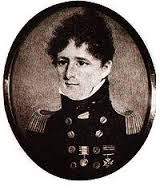 Some of Jane Austen's brothers were in the navy. We all know that sometimes British people, especially English people, are sometimes called Limeys, and most of us know that this is because the Royal Navy made its officers drink lime juice to prevent scurvy. In fact, it is to this practice that is largely attributed the great success of the British Empire.
Some of Jane Austen's brothers were in the navy. We all know that sometimes British people, especially English people, are sometimes called Limeys, and most of us know that this is because the Royal Navy made its officers drink lime juice to prevent scurvy. In fact, it is to this practice that is largely attributed the great success of the British Empire.What most people don't know is how long it took to have this practice recognized as a valid means of preventing the disease. It took at least 50 years for the science to be accepted. It was first proven effective by a German scientist in the 1750s, but people continued to ignore the evidence in favour of their own hack beliefs. Many people believed that washing your mouth out with urine was the best way to prevent scurvy. Some people thought scurvy came from tainted food. Some people thought it could be prevented by exercise.
I do not know precisely when the Royal Navy started mandating citrus juice for its officers, but it was in the early 1800s. So, I cannot say for certain what practices Jane Austen's brothers followed for the prevention of scurvy, but there may have been some dubious ones.
It was not until a good hundred years later that vitamin C was actually identified - more than 150 years after the first conclusive evidence that citrus fruits prevented scurvy. Vitamins were initially believed to be amines, which is where their name comes from: "Vital-Amines" but once it was discovered that they were not amines, the 'e' was dropped from the name.
Although limes became the popular fruit among the British due to its ready availability in the Caribbean colonies, the original fruit was actually lemons, so we could, in fact, call the Brits Lemonies.
Melanie Kerr is the author of Follies Past: a Prequel to Pride and Prejudice
Read Chapter 1 Watch the Trailers Order Paperback Download eBook


From Wikipedia:
ReplyDeleteJames Cook succeeded in circumnavigating the world (1768–1771) in HM Bark Endeavour without losing a single man to scurvy, but his suggested methods, including a diet of sauerkraut and wort of malt, were of limited value. Sauerkraut was the only vegetable food that retained a reasonable amount of ascorbic acid in a pickled state, but it was boiled to reduce it for preservation, and much of the vitamin C content was lost. In Cook's time it was impractical to preserve citrus fruit for long sea voyages. More important was Cook's regime of shipboard cleanliness, enforced by strict discipline, as well as frequent replenishment of fresh food.[31] The most effective rule implemented by Cook was his prohibition against the consumption of fat scrubbed from the ship's copper pans, then a common practice in the Navy. In contact with air the copper formed compounds that catalytically oxidised the vitamin C, destroying its efficacy.
Very interesting. I have also been told that the British belief that smells were the cause of illness caused them to keep their latrines clean and away from the kitchens, which reduced contamination and sickness due to bacteria. The practice, though motivated by bad science, was still effective. The limeys didn't carry around fresh citrus fruits. They kept it as cordial, and diluted it for drinking. That way it didn't spoil. They also kept their meat live, as in chickens, pigs and cows on board where they were slaughtered and eaten right away. There was no other way to keep the meat fresh.
ReplyDelete